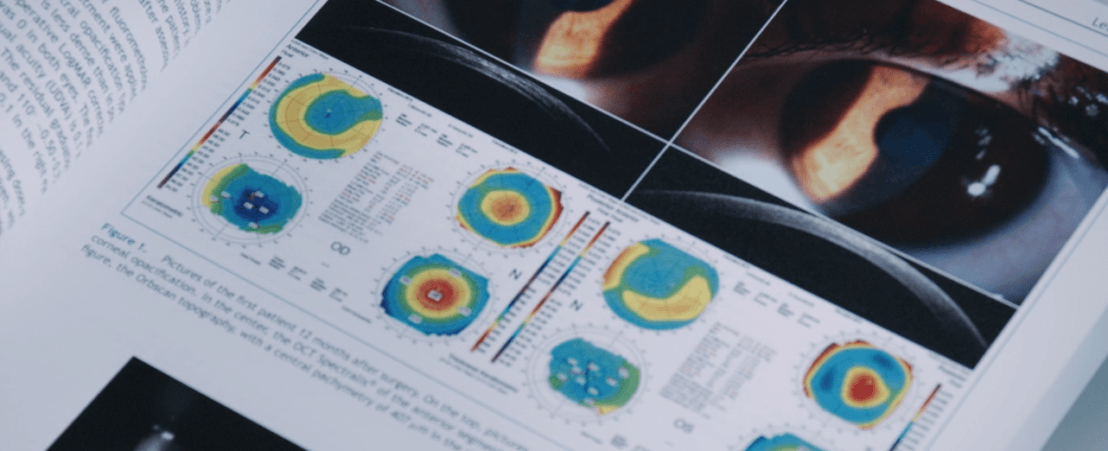
The ICR Research Department was created in June 2006 with the conviction that the best care for patients is achieved through meticulous assistance supported by professionals with solid training, the most advanced technology and rigorous research activity. The fundamental objective of the department is to promote, facilitate and guide research of the highest quality and rigour in the field of ophthalmology. The Research Department has its own facilities and specific, experienced staff.
The clinical research projects currently underway evaluate the latest diagnostic technologies and the latest medical and surgical treatments for ophthalmological pathology. Our participation in national and international research projects allows us to be in contact with the most advanced technology and the latest treatments.
The ICR is a member of the EVICR.net (European Vision Institute for Clinical Research network) of which about 100 institutions across Europe are members. All EVICR centres share rigorous and demanding procedures for conducting clinical studies and trials.
At ICR we are convinced that clinical and applied research brings new knowledge, rigour and strength to the healthcare we provide.
ICR has a Research Committee that reviews and evaluates each of the trials and projects that may be carried out at the institution. The Research Committee decides which are sufficiently interesting, scientifically innovative and respectful of ethical principles, and only those are accepted and implemented.
All clinical trials and studies go through the Research Ethics Committee (REC), an independent part of the ICR, which ensures the protection of patients participating in these studies. Without prior IRB approval, a project or trial cannot be carried out.
We are currently working on more than 20 projects at the time, including clinical trials and our own studies. That being said, this number oscillates throughout the year and could increase in the upcoming months.
ICR participates in Clinical Trials of different phases (I-IV) promoted by pharmaceutical laboratories and also carries out projects promoted by its own researchers (medical, optometry, auxiliary and nursing departments).
A large percentage of ICR staff are involved in research activity and all ICR researchers have the necessary up-to-date training in good clinical practice.
The following projects are currently active:
| Title | Area | Main Investigator |
| A Phase 2 Multicenter, Randomized, Double-masked, Sham-controlled, Reference-arm Study to Evaluate Efficacy and Safety of XXX in Patients with Geographic Atrophy (GA) associated with Age-related Macular Degeneration (AMD) | Retina | Dr. Jürgens |
| A Phase 3 Randomized, Double-Masked, Controlled, Efficacy and Safety Trial of Intravitreal XXX Gene Therapy in Adults with Neovascular (Wet) Age-Related Macular degeneration | Retina | Dr. Jürgens |
| A phase IV, multicentre, open-label, single-arm study to investigate the efficacy, safety and durability of XXX in caucasian patients with polypoidal choroidal vasculopathy | Retina | Dr. Jürgens |
| A Multicenter, Randomized, Double-Masked, Placebo-Controlled Phase 3 Study of the efficacy, safety, and tolerability of subcutaneously administered XXX in combination with YYY or YYY alone in participants with Geographic Atrophy secondary to Age-Related Macular Degeneration | Retina | Dr. Jürgens |
| A phase III multicenter, double-blind, randomized, placebo-controlled, parallel-group trial of the efficacy of XXX eye drops 2% on visual field preservation in patients with open angle glaucoma | Glaucoma | Dr. Antón |
| A multicentric, randomized, double-blind, placebo-controlled trial to evaluate the efficacy of XXX administered topically in patients with moderately severe non-proliferative diabetic retinopathy | Retina | Dr. Tsiroukis |
| Evaluación del efecto del BRUDYGLAUCO (DHA+Citicolina) en pacientes con glaucoma | Glaucoma | Dr. Antón |
We are currently working on several own studies, listed below. The Research Department provides support in designing the protocols for our own research studies, coordinates the processing of the relevant approvals, helps to set up the studies, monitors their execution and helps and advises on the dissemination of the results.
| Title | Area | Main investigator |
| El cociente estatura-eje axial ocular como índice predictivo de miopía infantil | Child myopia | Dr. Cavero and Marc Martínez, D.O.O. |
| Herramienta IA para ayudar a seleccionar el tipo de tratamiento más adecuado para cada paciente con glaucoma | Glaucoma, Artificial Intelligence | Dr. Antón |
| Evaluación de curvas tensionales con el dispositivo iCare | Glaucoma | Dr. Antón |
| Evaluación de la visibilidad del fondo de ojo mediante un dispositivo portátil de bajo coste (RetiSpot) en población infantil y adulta | Glaucoma | Dr. Antón |
| Evaluación del efecto del ácido tranexámico endovenoso profiláctico en el postoperatorio de cirugía palpebral. Estudio piloto observacional prospectivo de cohortes. | Oculoplastics | Dr. Alcaide |
| “Concordancia entre la gonioscopia y el AS-OCT (ANTERION®) en la valoración del ángulo iridocorneal”. | Glaucoma | Dr. Robles |
If you are interested in volunteering to participate in a trial or study, you can ask your ophthalmologist or contact the Research Department directly on +34 93 253 16 47. They will assess whether you meet the necessary requirements to participate in any of the Trials that are being carried out at the moment and will advise you if this is the case.
Currently the average number of scientific publications in journals is 12 per year. All of them can be consulted in the publications section.
At the same time, the Research Department holds the annual Research Awards, which from 2021 will be called the Dr. Ramon Martí i Bonet Ophthalmology Research Awards, in honour of the founder of the ICR. Since the first edition, several high-level projects have been highlighted, which have contributed to the research community in the areas of ophthalmology and optometry.
Head of Research at ICR:
Dr. Alfonso Antón
Research Department:
Antonio Morilla. Senior coordinator of clinical trials and studies.
Estela Sánchez. Junior coordinator of clinical trials and studies.
Liliana Araujo. Optometrist. Junior coordinator of clinical trials and studies.
Marc Martínez. Optometrist. Junior coordinator of clinical trials and studies.
Contact us or request an appointment with our medical team.